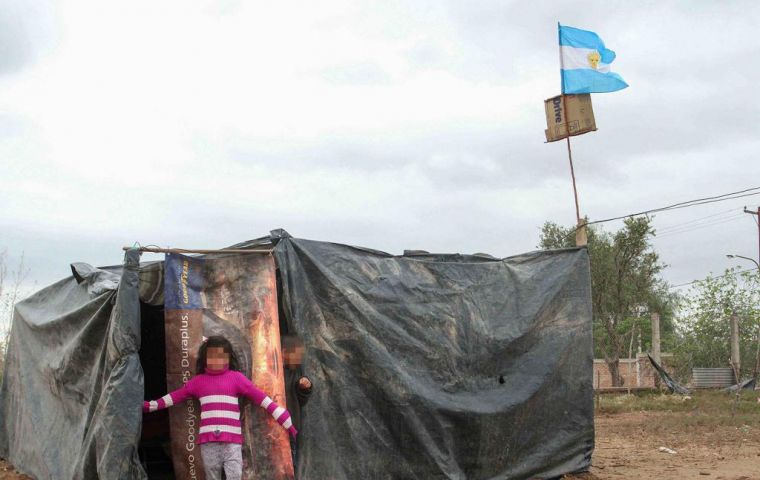MercoPress. South Atlantic News Agency
A third of Argentines, and one in two children living in poverty conditions, according to official data
 In the second half of 2017, poverty stood at 25.7% according to INDEC, rising to 27.3% in the first half of 2018
In the second half of 2017, poverty stood at 25.7% according to INDEC, rising to 27.3% in the first half of 2018 The poverty rate in Argentina during the second half of 2018 rose to 32%, or six percentage points from the same period the previous year, while 6.7% of citizens are living in a state of extreme poverty or indigence. The data was released by the INDEC Argentina's official statistics bureau on Thursday.
In the second half of 2017, poverty stood at 25.7% according to INDEC, rising to 27.3% in the first half of 2018. In the second half of 2016, the rate stood at 30.3%, according to official data.
The latest data, based on INDEC's Permanent Household Survey (EPH), indicates that 12.96 million people in Argentina are now considered poor. During the last calendar year, some 2.6 million people fell below the poverty line.
In a worrying detail, the number of poor children aged between 0 and 14 years increased from 39.7% in the latter part of 2017 to 46.5% at the end of 2018.
INDEC which measures poverty by income, concluded that 8.9 million people in the 31 largest urban centers in Argentina were living below the poverty line. The stats office does not measure poverty in rural areas, limiting its scope only to main cities.
Last year was a rough period for Argentina rife with economic turmoil, in which GDP contracted by 2.5% and inflation skyrocketed to 47.6%, its highest recorded tally since 1991.
Meanwhile, the national currency, the peso, devalued hugely in a currency crisis, losing more than half of its value against the US dollar. The subsequent fall in purchasing power – with inflation outstripping wage increases – has left many Argentines on the breadline.
Unemployment at present stands at 9.1%t, but it is expected to rise in double digits later this year. Inflation is showing no sign of stopping its meteoric rise, with price increases totaling 6.8% in the first two months of 2018.
Carolina Stanley, Minister of Health and Social Development, admitted on Thursday the government “thought we could lower inflation faster, and clearly, inflation impacts the poverty figure.” She added that “we reiterate that we will continue to prioritize the reduction of poverty”.
INDEC's data indicates that 23.4% of households were below the poverty line at the end of 2018. Of citizens, 6.7% live in extreme poverty, up from 4.8% the previous year.




Top Comments
Disclaimer & comment rules-

-

-

Read all commentsYour last paragraph could equally apply to the Kirchners and cohorts.We of course have the Blairs.
Apr 01st, 2019 - 03:21 pm 0Kamerad/Komrade Rique (AKA “Short Eyes,”) kind of a bummer since your friends aren't in power and you are missing the stipends, eh? Don't worry, La Asesina will be back, with a lot less money then she bagged prior to losing the election. But hey, the economy will revive, once the Argentine army can once again sell its ammo to the drug gangs, and the small chemical companies can once again begin shipping meth precursors to the Mexican cartels. I mean, what could possibly go wrong?
Apr 04th, 2019 - 09:33 am 0https://www.state.gov/j/inl/rls/nrcrpt/2014/vol1/223172.htm
I love the part about an “Honor System.” Especially in the land of “ Viveza Criolla”...
Ironically, Argentina president Mauricio Macri promised “zero poverty” during his 2015 election campaign, and in statements added that he wanted his government to be evaluated in function of his poverty reduction actions -- as well as on inflation reduction.
Mar 31st, 2019 - 05:37 pm -1Well: Three years later, reality is grim and shows a government in total denial of reality. However, who is to worry when close friends and associates are making a kill with sky-high energy prices and interest rates?
Commenting for this story is now closed.
If you have a Facebook account, become a fan and comment on our Facebook Page!